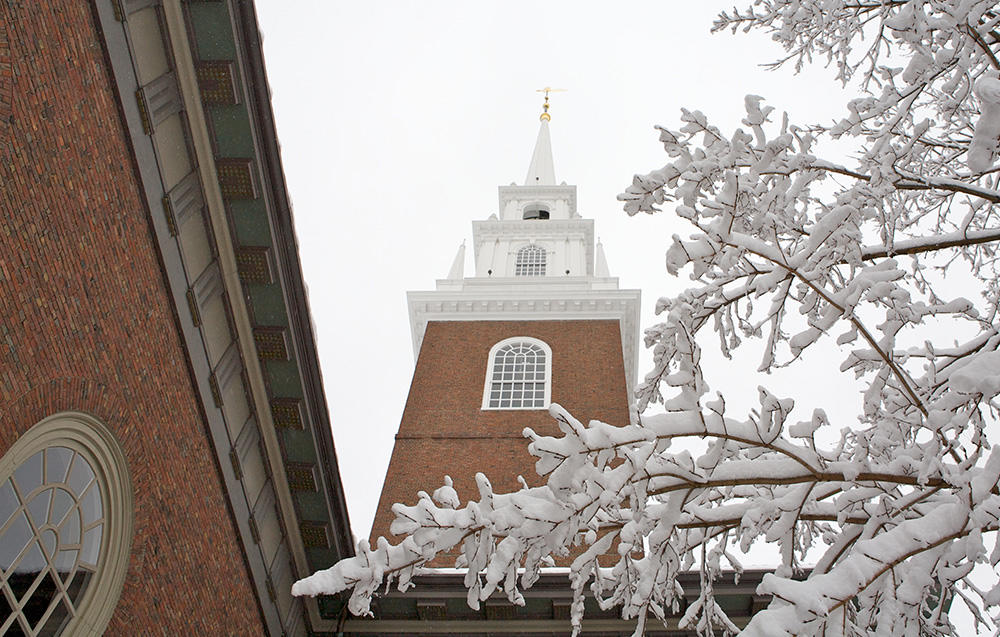By Westley Conn, Director of the Memorial Church School for Children, Morning Prayers talk as delivered on Sept. 27, 2016.

Matthew 12:2-8
When the Pharisees saw it, they said to him, ‘Look, your disciples are doing what is not lawful to do on the sabbath.’ He said to them, ‘Have you not read what David did when he and his companions were hungry? He entered the house of God and ate the bread of the Presence, which it was not lawful for him or his companions to eat, but only for the priests. Or have you not read in the law that on the sabbath the priests in the temple break the sabbath and yet are guiltless? I tell you, something greater than the temple is here. But if you had known what this means, “I desire mercy and not sacrifice”, you would not have condemned the guiltless. For the Son of Man is lord of the sabbath.’
About two years ago, after having finished my first semester of divinity school, I went on an 8-day silent retreat at a Christian monastery. The retreat included everything I expected: solitude, contemplation, spiritual reading, prayer, and outstanding food. There was, however, a new experience for me on this retreat: daily meetings with a spiritual director. My spiritual life was in need of direction after an arduous semester of late-night paper writing and reading what felt like volumes of commentaries.
I arrived at the retreat center on a wintry January afternoon, settled into my room, and then moseyed around the building until it was time to meet my spiritual director. At our introductory meeting, my director asked: “What would you like to get out of this retreat?” I explained to her how exhausted I was from the semester and that my prayer life had all but dwindled to quick prayers of mercy before exams. My director proceeded to talk about the importance of sleep; that I should take time to rest before I reengaged my spirituality. So, I listened to my director: I slept almost continuously for three days.
We heard in Matthew’s Gospel, Jesus identify himself as the lord of the Sabbath. Jesus, a devout Jew, knew the significance of Sabbath. In the Jewish tradition, this occurs on the seventh day of the week. This is kept as a day of sacred rest, for it is on this day, scripture tells us, that God rested after creating the earth and all that dwell therein. The importance of the Sabbath, and of rest, appears throughout Scripture, like in the Commandment to “Keep the Sabbath holy.”
Sabbath is inextricably connected to our sleep and relaxation. But, the rest God calls us to is more substantial than a nap and it is beyond the richness of sleep. I say this not to diminish the importance of sleeping, but rather I want to say that Sabbath is more than rest.
In his book, The Sabbath, Jewish theologian Abraham Joshua Heschel, expounded upon the meaning of sacred rest, of Sabbath. In it he said this about Sabbath:
To observe is to celebrate the creation of the world and to create the seventh day all over again, the majesty of holiness in time, ‘a day of rest, a day of freedom,’ a day which is like ‘a lord and king of all other days,’ a lord and king in the commonwealth of time. (pg. 19)
I believe Sabbath connects us to the sacredness of our own lives. It is a time when we rest with admiration and adoration for the transcendence of life through creation and our ability to be a part of the continuing of creation.
After my3-day sleeping binge I was ready for Sabbath. I was able to sit in the well-used reading chair with pure joy and astonishment for the intricately woven patters of my life, all knitted together in a way that led me right to that chair. My Sabbath took me for long walks in a frigid January snowstorm, during which I found myself laughing quietly and hysterically at tiny snowflakes as they blew around trees and rocks.
I invite you to experience Sabbath, to live in to the sanctity of the time that surrounds us. To conclude, I offer another quote from Heschel, wherein he comments on the Sabbath teachings of a 2nd century Rabbi:
To Rabbi Simeon eternity was not attained by those who bartered time for space but by those who knew how to fill their time with spirit. To him the great problem was time rather than space; the task was how to convert time into eternity rather than how to fill space with buildings, bridges and roads; and the solution to the problem lay in study and prayer rather than in geometry and engineering. (pg. 41)
Let us pray: Holy One, you have gifted us the Commandment of Sabbath, grant also to us the grace to keep it. Amen.
